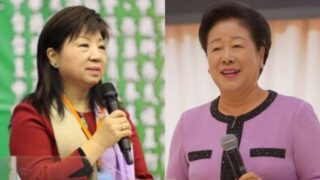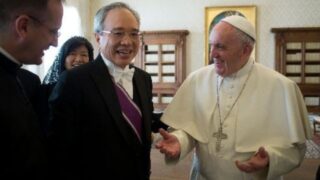In Vilnius at the RC-22 meeting of the International Sociological Association transitional justice and violations of freedom of religion were discussed.
by Marco Respinti


The Research Committee on Sociology of Religion (RC-22) of the International Sociological Association held on November 11–14, 2021, in Vilnius, Lithuania, its mid-term conference, on the theme “Religion, Politics, and Uncertainty: Shifting Boundaries.”
Session 4 of the conference was devoted to “Religion and Politics in China and Taiwan.” Besides including an unrelated (but interesting) paper by Lithuanian scholar Tadas Snuviškis, from Vilnius University, on the Consciousness-Only school of Buddhism in China, the session presented four papers related to the question of religious intolerance, transitional justice, and the Tai Ji Men case in Taiwan. The session was chaired and introduced by distinguished Lithuanian scholar of religion Rasa Pranskevičiūtė-Amoson, from Vilnius University.
Italian sociologist Massimo Introvigne, who also serves as editor-in-chief of Bitter Winter, discussed the political nature of the label xie jiao, a Chinese expression that is usually translated as “evil cults” but in fact was created in China to indicate “heterodox teachings” in the Middle Ages, long before the Western controversies on “cults.” In Imperial China, xie jiao were banned, and those participating in it subject to the death penalty, based on two criteria: they were regarded as hostile to the government, or at least not supporting it, and they were accused of practicing black magic.
Nationalist China, Taiwan, and Communist China all inherited the category of xie jiao and continued to crack down on them, although in different ways. That the category is political is confirmed, Introvigne said, by the different evaluation of some religious movements: in Mainland China it is forbidden to call xie jiao the Taiping and the Boxers, because Chairman Mao regarded them as patriotic and even proto-Communist rebels, yet the Taiping were the stereotypical xie jiao in Imperial China, and the anti-Christian Boxers were called a xie jiao by missionaries and Chinese Christians.
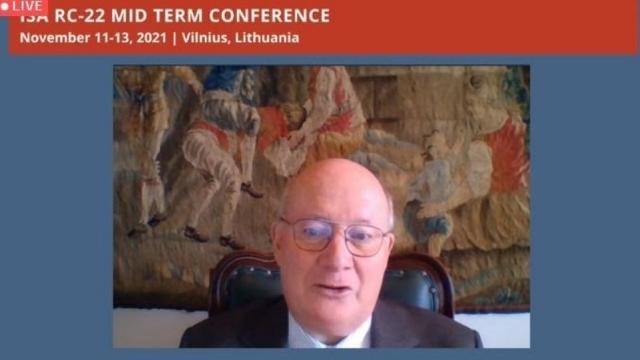

Introvigne then focused on Taiwan, noting how the category of xie jiao was used to discriminate against several religious movements during the Martial Law period, and discriminations and persecutions continued in the post-authoritarian phase, manifesting themselves in the politically motivated crackdown of 1996, which targeted several groups, including the large Buddhist order Fo Guan Shan, and also persecuted Tai Ji Men, although they had not taken any political position.
However, Introvigne concluded, when read by considering the history of the xie jiao category, it becomes obvious that such crackdowns have a political rather than a religious nature. The old accusations of not supporting the government and practicing black magic (Tai Ji Men was even accused, falsely and absurdly, of raising goblins) continued to be a work in Taiwan’s 1996 crackdown.
Chen Yi-Jing, an assistant professor at Taiwan’s National Taiwan University, discussed first the Tai Ji Men menpai and some of its peace activities, then the Tai Ji Men case. Chen explained that, in its present form, the Tai Ji Men Qigong Academy was established in 1966 in Taiwan by Dr. Hong Tao-Tze, and expanded both domestically and in the United States.
She then described the Movement from an Era of Conscience, launched in 2014 by Tai Ji Men and others, which was instrumental to have April 5 declared by the United Nations as the International Day of Conscience. Dr. Hong’s ideas about peace, love, and conscience have been promoted through visits and events in more than 300 cities in 101 countries, Chen said.
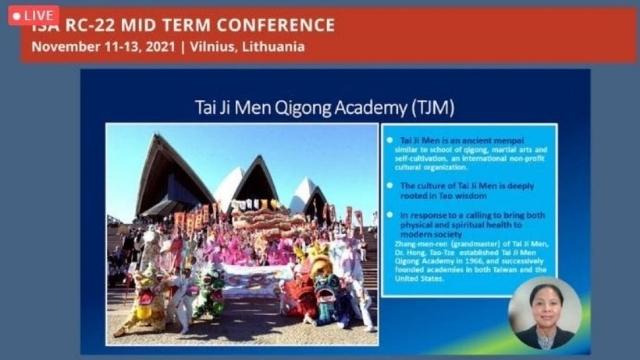

Chen then noted that religious and spiritual liberty is vulnerable in our turbulent times. Despite being highly praised by Taiwanese, in addition to international, authorities for its cultural and peace work, Tai Ji Men became a victim of the 1996 political crackdown already mentioned by Introvigne, during which Dr. Hong, his wife, and two dizi (disciples) were arrested. In 2007, finally the Supreme Court found them innocent of all charges, including tax evasion. This did not prevent the National Taxation Bureau (NTB) to continue imposing tax bills on Tai Ji Men and Dr. Hong, based on a tax evasion the Supreme Court had declared non-existing.
Finally, the NTB agreed to correct all tax bills to zero, except the one for 1992, for which it claimed a decision rendered by the Supreme Administrative Court in 2006 was final and no longer appealable. Based on the 1992 tax bill, in 2020 land intended for a Tai Ji Men self-cultivation center was seized, unsuccessfully auctioned, and then confiscated. Chen concluded that, since obviously how gifts were received by Dr. Hong and Tai Ji Men in 1992 was not different from the other years, substantial justice was not served in their case, which explains the widespread protests continuing in Taiwan.
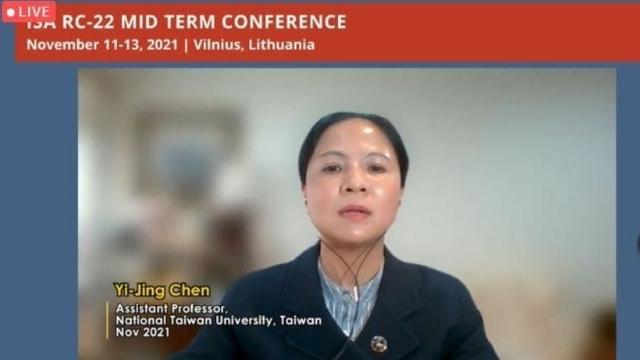

The case of Tai Ji Men is also related to transitional justice, defined by the United Nations as the rectification, after a transition from an authoritarian to a democratic regime, of the human rights violations perpetrated by the previous non-democratic government. Rosita Šorytė, a former Lithuanian diplomat and the author of several studies on religion-based human rights issues, explained how the United Nations, based on a decision rendered in 1988 by the Inter-American Court of Human Rights in the “Velásquez Rodríguez” case, evolved from its initial position considering transitional justice as the punishment of perpetrators of past abuses only.
Today, the United Nation promote a four-dimensional approach that calls not only for punishing those responsible of past wrongdoings, but also for telling the truth to the country, indemnifying the victims, and preventing future abuses that unfortunately can also happen in a democratic context.
Noting the contribution of the European Court of Human Rights in developing the concept of transitional justice, Šorytė examined several cases concerning her own country, Lithuania. In dealing with Lithuanian cases the European Court approved, but limited, the possibility of excluding those involved in past human rights violations from certain public positions. The Lithuanian experience also offered several cases dealing with religion, and with the restitution of properties confiscated by the past Communist regime to religious communities.
The principle that violations of religious liberty through unjust confiscation of properties should also be rectified through transitional justice, Šorytė said, is obviously relevant for Taiwan and the Tai Ji Men case. Not less relevant for the situation in Taiwan, she concluded, is the principle established by the European Court that investigating and acknowledging what truly happened when human rights were violated is as important as punishing the perpetrators and indemnifying the victims. As Jesus said, she concluded, it is the truth that sets humans free.
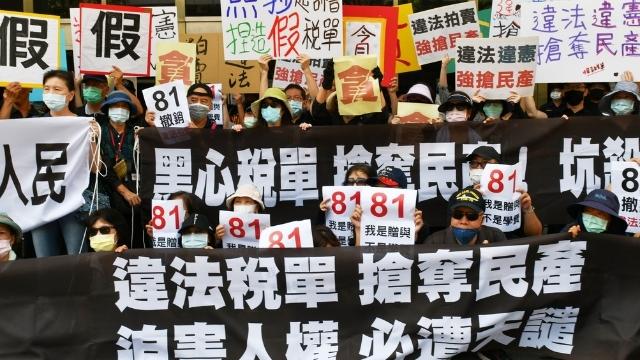

Professor Tsai Cheng-An from Shih Chien University, Taipei, discussed how the principles affirmed by the United Nations about transitional justice have been applied in Taiwan, a country which has made the International Covenant on Civil and Political Rights (ICCPR) and the International Covenant on Economic, Social and Cultural Rights (ICESCR) part of its domestic law. While the current President of Taiwan, Tsai Ing-Wen, has promised to implement transitional justice and has taken some measures, these exclude abuses perpetrated after 1992, including those of the 1996 crackdown against several religious movements.
The Tai Ji Men case, said Tsai, not only shows that post-1992 abuses should also be considered by transitional justice in Taiwan, but evidences how a whole category of violations of human rights has not been taken into account, those of which the National Taxation Bureau was responsible. Additionally, there has been no reform of the tax system, and abuses continue to this very day.
These papers, presented in a prestigious scholarly context, constitute a welcome addition to the growing corpus of studies of violations of religious liberty in Taiwan, of which the Tai Ji Men case, which is still not solved after 25 years of legal struggle, constitutes the most egregious example.




